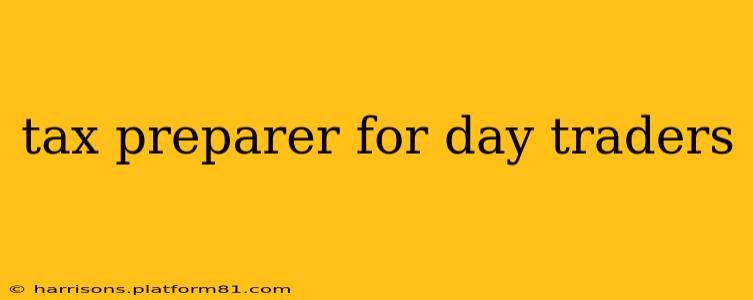Day trading, the practice of buying and selling securities within the same trading day, presents unique tax challenges. Unlike long-term investors, day traders must meticulously track their trades and understand the specific tax implications. Finding a tax preparer experienced in handling the complexities of day trading is crucial for accurate tax filing and minimizing your tax liability. This guide will help you understand what to look for in a tax professional and how to navigate the intricacies of day trading taxes.
What Makes Day Trading Taxes Different?
The primary difference lies in how capital gains are treated. Long-term capital gains (assets held for over one year) are taxed at lower rates than short-term capital gains (assets held for one year or less), which are taxed at your ordinary income tax rate. Since day traders, by definition, hold assets for less than a day, all their profits are considered short-term capital gains, significantly impacting their overall tax burden. Furthermore, day traders often generate significantly higher trading volume than long-term investors, leading to a more complex tax return. This necessitates meticulous record-keeping, which is critical for a successful tax filing.
How to Find a Tax Preparer for Day Traders?
Finding the right tax professional is paramount. Look for someone with specific experience in:
- Section 1256 Contracts: Many day traders utilize futures and options contracts, which fall under Section 1256 of the Internal Revenue Code. A knowledgeable preparer understands the unique tax treatment of these contracts.
- Wash Sales: Day traders might engage in wash sales (selling a security at a loss and repurchasing it within a short period), which are disallowed for tax purposes. A qualified tax preparer can help you avoid these pitfalls.
- Qualified vs. Unqualified Business Income Deduction (QBI): Depending on your trading activity and business structure, you might qualify for deductions under QBI. A skilled tax preparer will determine your eligibility and help maximize your deductions.
- Detailed Record Keeping: The ability to handle large volumes of transaction data is essential. A tax professional should be comfortable working with brokerage statements, trade confirmations, and other relevant financial documents.
What Questions Should I Ask a Potential Tax Preparer?
Choosing the right tax preparer involves asking the right questions. Here are a few key questions to consider:
What is your experience with day trading clients?
This is crucial. You want someone who understands the specific tax implications of your trading activities, not a generalist.
Do you understand Section 1256 contracts and their tax treatment?
This indicates familiarity with the regulations affecting many day trading strategies.
How do you handle large volumes of transaction data?
Efficient data management is crucial for accurate tax preparation.
What software or tools do you use for tax preparation?
Sophisticated software can significantly improve accuracy and efficiency.
Do you offer year-round tax planning services?
Proactive tax planning can help minimize your tax liability.
What Documents Do I Need to Provide My Tax Preparer?
Accurate tax preparation requires comprehensive documentation. Gather these essential documents:
- Brokerage statements: These are crucial for documenting all your trades.
- Trade confirmations: These provide detailed information about each transaction.
- Records of expenses: This includes software subscriptions, educational materials, and other business-related expenses.
- Form 1099-B: This form reports proceeds from brokerage transactions.
Organize your documents meticulously to streamline the tax preparation process.
Can a CPA be a better choice than a regular tax preparer?
While many tax preparers can handle day trading taxes, a Certified Public Accountant (CPA) often possesses a deeper understanding of tax law and more complex financial situations. Their expertise can be particularly valuable for navigating the intricate regulations surrounding day trading. However, a highly experienced and specialized tax preparer may suffice. The deciding factor should be their demonstrated expertise in day trading tax situations.
By carefully selecting a tax preparer with specialized knowledge and meticulously organizing your financial records, you can navigate the complex world of day trading taxes with confidence and ensure accurate and efficient tax filing. Remember, proactive tax planning throughout the year, not just during tax season, is key to minimizing your tax burden.
